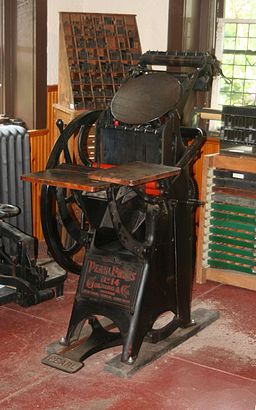The Coming Speculative Fiction Storm
Over the last seven years, major shifts in the publishing world have rocked traditional publishing channels. Namely, print-on-demand to start, but even more so, ebooks and Amazon. In short, self-publishing.
It’s not like self-publishing didn’t exist until recently. Some famous authors self-published in times past, Mark Twain being one example. But your average author couldn’t do that because of the upfront cost of paying a printer for the run of a thousand or more of a book, and then the work and expense of marketing and distributing them to bookstores. It easily ran into the thousands of dollars.
So only a handful of people ever self-published. The only real shot most had was to get a manuscript accepted by a publisher.
The in the 1980s vanity publishing came to the forefront. They generally knocked the entry price down for self-publishing to around one thousand. This allowed a lot more people to self-publish than before, so a new crop of “self-published” writers entered the market.
Problems arose on two ends. One, vanity publishing wasn’t really self-publishing in the full sense. Indeed, Yog’s law came into play: Money always flows to the writer. More accurately, when you are selling your rights, money always flows to the writer. Because with true self-publishing, you don’t sell your rights, even though you put money up to get published.
But in vanity publishing, you sell your rights and put money up front, sometimes quite a lot if you purchase several of their services. This combination qualifies as a scam.
Two, despite that, vanity publishing became equated with self-publishing. Since vanity publishers offered little to no editing, the books were often poorly written/edited. If you bought their editing services for a hefty fee, it often would not be of professional quality. Formatting and book binding/printing were often substandard. Add in authors who didn’t put in the effort to create a professional product, and self-publishing became equated with low-quality.
Still, self-publishing wasn’t a viable route. There were a few success stories, but precious few, primarily due to low numbers. While more were “self-publishing,” it was still a tiny fraction of books being published in a given year. So until around 2004, an author was limited to traditional publishers to get their book to market.
Then POD, print on demand, became a viable publishing model for print books. For the first time, a person could start a small publishing venture without the burden of inventory, overhead, or huge print runs. While getting into bookstores was still difficult, the success of Amazon allowed for a viable distribution channel.
While more people self-published using POD, it also gave rise to a lot of small independent publishers. My first book was published by one such small publisher, Double-Edged Publishing (now out of business—that series is now with another small publisher, Splashdown Books).
The real boast to self-publishing came with Amazon’s introduction of the Kindle ereader, and the ability of authors to publish directly in that distribution channel. The cost to self-publish went from the thousand or more dollars of vanity publishing, not counting the preparation of the book, to zero. As Amazon succeeded in creating a demand for the ebook market, self-publishing became not only possible and viable, but profitable.
This created the shifts I mentioned. For the first time in forever, an author no longer needed a publisher to economically publish their book and have readers find and buy it. Indeed, in many cases, more authors could make a living self-publishing who struggled in the traditional publishing channel. In the last three to five years, the number of mid-list and best-selling authors who are self-publishing either in part or in whole has blossomed. Some turning down traditional publishing deals and advances because they know they can make more money publishing it themselves.
So, what does all this have to do with readers, especially Christian speculative fiction readers? Why the history lesson? To give background for the following points.
How Does the Publishing Shifts Affect Readers?
1. Wider selection of reading choices. Without the restriction on the flow of books to market created by the traditional publishing and bookstores channel, many more books are able to reach readers than before.
On the positive side, many good books that never would have made it through the traditional publishing channel due to small market, no slot in publishing schedule, hard to peg market, publisher already has books like it, etc., will now be available.
On the negative side, many bad books that never would have survived the traditional publishing’s gauntlet will now be available. The increase in published books means it will be easier for a reader to miss books they’d really like due to time, money, and difficulty finding them. While self-publishing is quickly losing its stigma of low-quality, there are still some books a reader will wade through that would have never seen the light of day in the traditional publishing channel. Moon People, anyone?
2. It will be easier to find books targeted to small markets and cross-genre/difficult to market books. Publishers tend to be reluctant to publish anything they don’t believe will sell into the thousands of thousands. A small market or difficult to identify market is a huge financial risk for them. But not a self-publisher. Want to find an Amish-vampire-space opera book? It’s out there, but not from a traditional publisher.
3. Books not able to meet CBA (Christian Booksellers Association) litmus tests have a means to find their audience. This is a biggie for Christian Speculative fiction. Not merely due to the censorship issue, but because it doesn’t rely upon Christian bookstores, which are often held hostage by their most legalistic customers. Those same people can’t effectively convince Amazon or B&N to take titles off their shelves that they deem unholy. Not like they can at their local Christian bookstore.
It also means there’s going to be more “Christian” titles that are theologically and morally questionable. Reader discernment skills, like we’ve been discussing lately, are even more important.
That said, as self-publishing in Christian circles follows the general market trend, as it usually does, you can expect to see more creative and original horror, space opera, fantasy, and other speculative fiction titles. That, overall, will be a good thing. Plus, it will put more pressure on the CBA-linked publishers to open their doors to more speculative fiction titles.
The Christian speculative fiction storm is coming.
What are further benefits/negatives that I’ve not listed, for readers, do you see from this shift?









































I tend to shy away from anything labeled “self-published”. The stigma of “self-published” equaling “sub-standard” is still firmly fixed in my mind. It’s going to take a lot of high quality self-published books to change that. However, I am excited about self-publishing putting pressure on the CBA to loosen up a bit.
^^^ This. ^^^
Well, I should have made clearer what I meant by low quality. After all, there are plenty of low quality books published by traditional publishers if by low quality you mean poorly edited, plots that don’t work well, or break writer rules all over the place. That type of stuff you’ll find in both camps.
What you won’t find in traditionally published books is a book like Moon People, which is why I gave it as an example. Each page filled with typos, grammar errors, punctuation errors, and bad writing such as to make it nearly impossible to follow the story. I think it is this kind of book that people think about when they think low quality. But then any self-published book that has any errors gets lumped in with books like Moon People, even though you could easily find books of similar quality selling under a traditional publisher’s imprint.
In large part due to a growing number of traditionally published authors moving to self-publishing, and a big percent who do get their work edited and professionally formatted, and the best seller lists now regularly containing a good number of self-published books, there is a lot of quality stories being self-published. The only problem is there is nothing stopping a person who doesn’t care from publishing their first draft, mistakes an all. Unfortunately, some do. But that fact doesn’t negate all those self-published authors who do care and take the time to put out a quality product. I don’t think you can paint all self-published books in one color anymore than you can say all blacks are (whatever).
What I do think is true is some of this hasn’t hit Christian books as much as its happening in the general market, being it is always a few years behind the general market it seems. So the number of quality self-published books won’t be as high as you’re getting in the general market. Another factor in that is the propensity for Christian authors to feel their message is so important, that they ignore quality issues in storytelling.
That said, you can find good Christian self-published books out there. I don’t know what that percentage is, but it can’t be zero or close to it. As that grows like it is in the general market, and they start getting on the radar screen of readers like they are in the general market, and competing head-to-head with traditionally published books, and winning like they are in the general market, you’ll see the same perception shifts in the Christian market as is happening in the general. It just hasn’t hit us yet. When it does, expect to see the traditional Christian publishers struggle to deal with the shifts as general market ones are doing right now.
But my overall belief is that this will be good for readers of Christian books, especially speculative fiction books who have had a history of struggling to get a foot hold through traditional publishers, primarily because traditional Christian publishers have trouble reaching the spec-fic market since that market doesn’t tend to visit Christian bookstores.
The shift to online book retailing is the primary factor in allowing such publishers to venture into more genres that don’t sell in Christian bookstores. Yet it is non-traditional publishers like Marcher Lord Press, now Enclave, that has proven that the primarily online retail of Christian spec-fic has a viable market and is the reason you’re seeing a growing number of CBA spec-fic in the last few years.
More options, even if some of those options include Moon People quality, is a good thing for readers overall, because it also means more quality books available for readers than what traditional publishers could hope to produce.
Originally I had wanted to be traditionally published (who doesn’t?), but after much consideration I’ve decided to self-publish my third novel. Restrictions imposed by “Christian” publishers seem to stifle creativity, and when one is self-published there aren’t any restrictions for the author to worry about.
Recently I’ve stopped marketing my books as “Christian fiction” even though the characters may discuss God and grapple with moral issues. I’ve decided I will market them to Christians who read fiction instead of to readers of Christian fiction. Does that make sense?
Yes, in a way it makes sense if you define Christian fiction as synonymous with the CBA market through bookstores. Christians read a lot of general market fiction. Those are the ones you’re targeting.
I wonder how much of the ebook trend is cross-pollinated with fanfiction trends. While fanfiction is not generally considered “literature” and is not usually sold due to copyright concerns, several sites and applications exist for downloading fanfics to e-readers, some with more accurate formatting than others.
In fact, I have more fanfics on my kindle than published books, even if Kindle’s free classics are included.
Great post!
I set out to write New York market-worthy fiction from a Christian worldview. While I had interest from the CBA, my characters do not come to faith or use faith to overcome their obstacles so I had to go ABA and was happy to sign with an independent press that totally gets it. So it IS possible to publish “Christian fiction” traditionally. My debut scifi comes out in November.